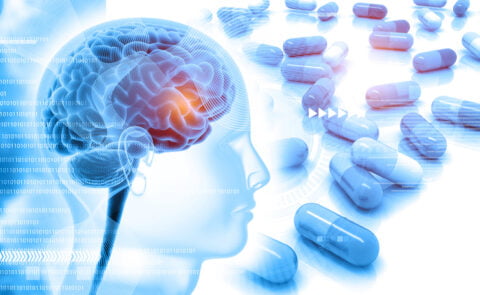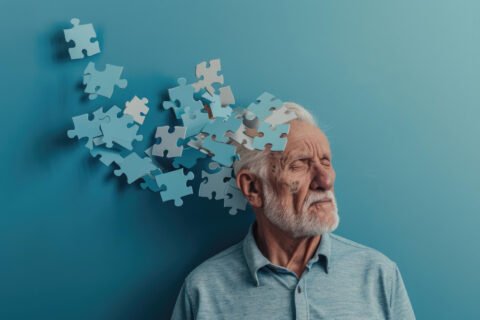Have you ever noticed an elderly loved one struggling with memory or confusion? It can be a scary experience, and you might wonder if it’s dementia or Alzheimer’s disease. While the terms are often used interchangeably, there are key differences between them. Understanding these distinctions can empower you to seek proper diagnosis, explore treatment options, and provide the best possible support.
This comprehensive guide will equip you with the knowledge to navigate the world of dementia and Alzheimer’s. We’ll delve into the core differences between the two, explore the stages of Alzheimer’s, and answer common questions like how to identify warning signs, differentiate between types of dementia, and find treatment options.
What are the Main Differences Between Alzheimer’s and Dementia?
Dementia is an umbrella term for a group of conditions that cause a decline in cognitive abilities severe enough to interfere with daily life. It’s not a specific disease, but rather a syndrome characterised by symptoms like memory loss, difficulty thinking and reasoning, and problems with language and communication.
On the other hand, Alzheimer’s disease is the most common cause of dementia, accounting for roughly 60-80% of cases. It’s a progressive neurodegenerative disease, meaning brain cells deteriorate and die over time. This degeneration leads to the characteristic symptoms of dementia, which steadily worsen as the disease advances.
| Feature | Dementia | Alzheimer’s Disease |
| Definition | General term for decline in cognitive abilities | Specific neurodegenerative disease |
| Causes | Various, including Alzheimer’s, vascular problems, Lewy body dementia | Protein buildup (amyloid plaques and tau tangles) in the brain |
| Symptoms | Memory loss, thinking difficulties, communication problems | Memory loss (especially forgetting recent events), difficulty with familiar tasks, confusion, personality changes |
| Progression | Varies depending on the cause | Gradual worsening of symptoms over time |
What are the 7 Stages of Alzheimer’s NHS?
The National Health Service (NHS) outlines seven stages of Alzheimer’s disease, highlighting the progressive nature of the condition. Here’s a simplified breakdown:
- Stage 1 (Pre-dementia): Subtle changes in memory, like forgetting names or appointments.
- Stage 2 (Early-stage): Increased forgetfulness, difficulty concentrating, and mild personality changes.
- Stage 3 (Mid-stage): More significant memory loss, confusion, and problems with daily activities.
- Stage 4 (Mid-stage): Difficulty recognizing familiar people and places, needing assistance with self-care.
- Stage 5 (Mid-stage): Increased dependence on others for daily tasks, personality changes become more pronounced.
- Stage 6 (Late-stage): Severe memory loss, needing constant care, inability to communicate effectively.
- Stage 7 (Late-stage): Complete dependence on others for all care, physical decline.
How Do You Know What Stage of Dementia Someone Is In?
Diagnosing the stage of dementia involves a comprehensive evaluation by a healthcare professional. They will typically conduct cognitive tests to assess memory, thinking, and reasoning skills. Additionally, they may request medical history, imaging scans, and blood tests to rule out other potential causes.

How Do You Know If It’s Alzheimer’s or Dementia?
There isn’t a single test to differentiate between Alzheimer’s and other forms of dementia. However, healthcare professionals rely on various tools, including:
- Detailed medical history: Understanding the patient’s symptoms, progression, and risk factors provides valuable clues.
- Cognitive assessments: Specific tests gauge memory, thinking, and language abilities.
- Brain imaging: Scans like MRI or PET scans can reveal abnormalities in the brain structure.
- Laboratory tests: Blood tests can help rule out other conditions that mimic dementia symptoms.
What is the Biggest Difference Between Alzheimer’s and Vascular Dementia?
Vascular dementia is the second most common cause of dementia after Alzheimer’s. It arises due to problems with blood flow to the brain, often caused by strokes or mini-strokes. Here’s a comparison of the key differences:
| Feature | Alzheimer’s Disease | Vascular Dementia |
| Cause | Protein buildup in the brain | Problems with blood flow |
| Symptoms | Gradual decline in memory, thinking, and reasoning | Sudden onset of symptoms, difficulty with planning and problem-solving, emotional changes |
| Progression | Steady worsening | Symptoms may fluctuate or worsen in steps |
What are the 10 Warning Signs of Dementia?
Early detection of dementia is crucial for optimising treatment and support. Here are 10 potential warning signs to be aware of:
1. Increased forgetfulness, especially forgetting recent events or conversations: This is a common early sign of dementia. People with dementia may forget where they placed things, have trouble remembering appointments, or struggle to recall recent conversations.
2. Difficulty performing familiar tasks: Once simple activities of daily living become challenging, it could be a warning sign. This could involve tasks like cooking a familiar meal, following a recipe, paying bills on time, or managing finances.
3. Problems with language and communication: Struggling to find the right words, forgetting common names, or having difficulty following conversations are potential indicators of dementia. They may become easily frustrated during conversations, repeat themselves frequently, or take longer to find the words they want to express themselves.
4. Disorientation to time and place: Losing track of time, confusion about dates or seasons, or getting lost in familiar surroundings can be a red flag. People with dementia might forget what day of the week it is, have difficulty following along with a calendar, or become disoriented even in familiar places.
5. Poor judgment: Making risky decisions regarding finances, safety, or personal care could be a sign of dementia. This could involve neglecting personal hygiene, falling for scams easily, spending money impulsively, or making unsafe choices like leaving the stove on unattended.
6. Difficulty performing familiar tasks: Once simple activities like cooking, paying bills, or managing finances become challenging, it could be a cause for concern.
7. Problems with language and communication: Struggling to find the right words, difficulty following conversations, or needing help with writing are potential signs.
8. Disorientation to time and place: Losing track of time, confusion about dates or seasons, or getting lost in familiar surroundings can indicate dementia.
9. Poor judgment: Making risky decisions regarding finances, safety, or personal care might be a red flag.
10. Changes in mood and personality: Increased withdrawal, depression, anxiety, or unusual behaviours can be linked to dementia.
Remember, these signs don’t necessarily guarantee dementia. However, if you notice several of them in yourself or a loved one, it’s crucial to consult a healthcare professional for a proper evaluation.
At What Stage Do Alzheimer’s Patients Sleep a Lot?
Increased sleep and changes in sleep patterns are common in later stages of Alzheimer’s disease (typically stages 5 and above). This can manifest as excessive daytime sleepiness, nighttime restlessness, or sleep-wake cycle reversal (sleeping during the day and being awake at night).
Can Dementia Turn into Alzheimer’s?
Dementia itself doesn’t transform into Alzheimer’s disease. However, Alzheimer’s is a progressive condition, and the symptoms of dementia will worsen over time. In some cases, people with other forms of dementia may develop features of Alzheimer’s disease as the condition advances.
What is the Most Aggressive Form of Dementia?
Lewy body dementia and frontotemporal dementia are considered to be among the most aggressive forms of dementia. They progress rapidly and can be particularly challenging to manage due to the associated symptoms like hallucinations, personality changes, and difficulty with movement.
Which Comes First, Alzheimer’s or Dementia?
Dementia is the broader term encompassing various conditions. Alzheimer’s disease is a specific type of dementia, so it wouldn’t come first. You can only have Alzheimer’s if you already have dementia caused by the buildup of amyloid plaques and tau tangles in the brain.
What Stage of Dementia is Staring?
Staring can occur at various stages of dementia, but it’s more prominent in the later stages (typically stages 5 and above). It can be caused by a decline in cognitive function that makes it difficult to focus or engage with the environment. In some cases, staring may be linked to visual processing problems or difficulty interpreting visual information.
What is the 2 Finger Test for Dementia?
The two-finger test, also known as the Bender Visual Motor Gestalt Test (BVGT), is not a definitive diagnostic tool for dementia. It’s a cognitive assessment tool used by healthcare professionals to evaluate visuospatial skills, motor function, and attention. The test involves copying geometric shapes, and a person with dementia may struggle to accurately reproduce the patterns.
What is the Number One Food that Fights Dementia?
There isn’t a single “superfood” proven to prevent dementia. However, a healthy diet rich in fruits, vegetables, whole grains, and lean protein is essential for overall brain health. Studies suggest that the Mediterranean diet may offer some protective benefits against cognitive decline.
How Can I Test for Dementia at Home?
While there aren’t definitive home tests for dementia, some cognitive screening tools can be found online or in brain health resources. These may offer clues about potential memory or thinking problems, but they shouldn’t replace a professional evaluation. Early detection is crucial, so if you notice any concerning signs, consult a healthcare professional for proper diagnosis.
Can Dementia Be Treated if Caught Early?
Unfortunately, there’s no cure for dementia. However, early detection allows for prompt intervention, which can significantly improve quality of life and manage symptoms. Treatment options for dementia may include medications to manage memory loss, behavioral therapies, and lifestyle modifications to promote brain health.
What Confirms Dementia?
There’s no single test to confirm dementia. Diagnosis typically involves a comprehensive evaluation by a healthcare professional, including:
- Detailed medical history: Understanding the patient’s symptoms, risk factors, and family history is crucial.
- Cognitive assessments: These tests gauge memory, thinking, reasoning, and language abilities.
- Brain imaging scans: MRI or PET scans can reveal abnormalities in the brain structure associated with dementia.
- Laboratory tests: Blood tests can help rule out other conditions that mimic dementia symptoms.
A combination of these assessments helps healthcare professionals arrive at a diagnosis and recommend the most appropriate treatment plan.

What is the Strongest Predictor of Dementia?
Age is the strongest risk factor for dementia, with the risk increasing as you get older. However, other factors can also contribute, such as:
Strongest Predictors of Dementia
- Family history: Having a close relative with dementia increases your risk.
- Genetics: Certain genes, like APOE-e4, are linked to a higher risk of Alzheimer’s disease.
- Cardiovascular health: Conditions like high blood pressure, high cholesterol, and diabetes can raise dementia risk.
- Head injuries: A history of severe head injuries may increase the risk of dementia later in life.
- Lifestyle factors: Smoking, excessive alcohol consumption, and physical inactivity can contribute to dementia risk.
What is the Best Treatment for Dementia?
There’s currently no cure for dementia, but there are treatment options available to manage symptoms and improve quality of life. Here’s an overview of some common approaches:
- Medications: Several medications can help manage memory loss associated with Alzheimer’s disease and other forms of dementia. These medications work by boosting specific brain chemicals or slowing down the progression of the disease.
- Therapies: Cognitive stimulation therapy, occupational therapy, and music therapy can help maintain cognitive skills, improve mood, and promote daily function.
- Lifestyle changes: A healthy diet, regular exercise, quality sleep, and social engagement are crucial for overall brain health and well-being. These lifestyle modifications can help manage dementia symptoms and slow down cognitive decline.
What are the Three Golden Rules of Dementia Care?
For caregivers supporting individuals with dementia, here are three golden rules to remember:
- Validate and empathise: People with dementia may experience confusion, frustration, or fear. Acknowledge their feelings, and offer reassurance and support.
- Maintain routines and structure: Provide a predictable daily routine with familiar activities. This can create a sense of security and reduce anxiety.
- Focus on strengths and abilities: Don’t dwell on what the person can’t do anymore. Encourage independence and focus on their remaining strengths and capabilities.
What is the Latest Treatment for Dementia?
Researchers are constantly exploring new avenues for dementia treatment. Here are some promising advancements:
- Personalized medicine: Tailoring treatment plans based on individual genetic and biological factors.
- Anti-amyloid therapies: These medications target the buildup of amyloid plaques in the brain, a hallmark of Alzheimer’s disease.
- Lifestyle interventions: Studying the potential of specific dietary patterns, exercise programs, and cognitive training to slow down cognitive decline.
While there’s no guaranteed cure yet, these ongoing efforts offer hope for future breakthroughs in dementia treatment.
Conclusion
Dementia and Alzheimer’s can be overwhelming topics, but with proper knowledge and support, you can navigate this journey. Remember, early detection is key. If you have any concerns about yourself or a loved one, don’t hesitate to consult a healthcare professional. By working together, we can create a better understanding of these conditions and advocate for improved treatment options in the future.
A: Dementia is an umbrella term for a decline in cognitive abilities that interferes with daily life. Alzheimer’s disease is the most common cause of dementia, but there are other types. Dementia symptoms can vary depending on the underlying cause.
A: Unfortunately, there’s no cure for dementia. However, early detection allows for interventions that can manage symptoms, improve quality of life, and potentially slow down progression.
A: Early signs can be subtle, but forgetting recent events, difficulty concentrating, and mild personality changes are potential indicators.
A: Diagnosis involves a comprehensive evaluation by a doctor, including medical history, cognitive assessments, brain imaging scans, and blood tests.
A: Other types include vascular dementia (caused by blood flow problems), Lewy body dementia (involving abnormal protein deposits), and frontotemporal dementia (affecting personality and behavior).
A: The exact cause is unknown, but it’s linked to the buildup of proteins (amyloid plaques and tau tangles) in the brain that damage brain cells.
A: While memory loss is common in dementia, Alzheimer’s typically focuses on memory issues early on. Other dementias may have more prominent symptoms like difficulty with planning, personality changes, or hallucinations.
A healthy lifestyle with a balanced diet, regular exercise, quality sleep, and social engagement may help promote brain health and potentially reduce dementia risk.
A: Not necessarily. Occasional forgetfulness can be normal. However, if memory loss significantly impacts daily life, it’s crucial to consult a doctor for evaluation.
A: While there’s no cure, treatment options include medications to manage symptoms, therapies to maintain cognitive function, and lifestyle modifications to support overall brain health.




